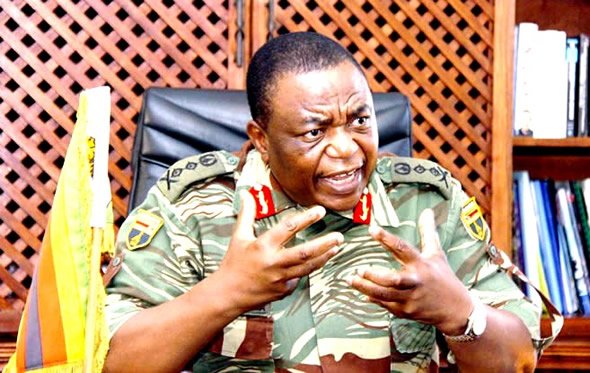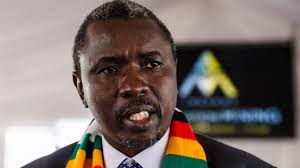Chiwenga goes silent leaving the nation guessing

UNTOUCHABLE: Vice President Gen. Constantino Chiwenga
Wondering if ‘criminals and false prophets’ around the President are about to be booted out
By Tambanavo Chamanyawi
HARARE, Zimbabwe – Vice President Constantino Chiwenga has gone silent, retreating to the drawing boards after launching a veiled attack on his boss, President Emmerson Mnangagwa, during a high-profile event at the National Heroes’ Acre.
His scathing critique of greed, corruption, and tribalism has left the nation guessing: what is the Retired General’s next move? Will Zimbabweans wake up to mass protests destined for State House, demanding Mnangagwa’s exodus?
Or will they witness on ZBC a man in military camouflage announcing the purging of “criminals” and false prophets around the president, followed by the dramatic exit of “Ngwena” (The Crocodile), as Mnangagwa is affectionately known?
The political tension within Zimbabwe’s ruling party, ZANU-PF, has reached a boiling point, with Chiwenga’s silence fueling speculation about a possible power struggle. His speech as Acting President, while Mnangagwa was on annual leave, was widely interpreted as a direct challenge to the president’s leadership and his association with controversial figures accused of looting state resources.
Chiwenga’s Scathing Critique
Standing before a crowd of mourners and party loyalists at the National Heroes’ Acre, Chiwenga did not mention Mnangagwa or any specific individuals by name. However, his words left little doubt about the target of his criticism.
“We fought for this nation to be free from oppression, exploitation, and inequality,” Chiwenga declared. “But today, we are faced with new enemies: greed, corruption, and tribalism. These are the scourges that threaten to destroy everything we fought for.”
Chiwenga’s speech struck a chord with many Zimbabweans who have grown disillusioned with the ruling party’s failure to address rampant corruption and economic mismanagement. His reference to tribalism was particularly pointed, as it echoed long-standing allegations that Mnangagwa’s administration favors certain ethnic groups over others.
“We cannot allow a few individuals to enrich themselves at the expense of the masses,” Chiwenga continued. “The revolution was not fought for the benefit of a select few. It was fought for the people, and it is our duty to protect their interests.”
The Chivayo Connection
Although Chiwenga did not name names, his remarks were widely seen as a critique of Mnangagwa’s allies, including flamboyant businessman Wicknell Chivayo, who has become a symbol of corruption and cronyism in Zimbabwe. Chivayo, who is suspected of securing lucrative government tenders through questionable means, has drawn public ire for his extravagant lifestyle, including donating luxury vehicles worth millions of dollars to musicians and social media influencers.
Chivayo’s ostentatious displays of wealth have sparked outrage in a country where millions struggle to make ends meet. Critics argue that his close ties to the Mnangagwa administration exemplify the very corruption Chiwenga condemned in his speech.
In response to Chiwenga’s remarks, Chivayo took to social media to defend himself, dismissing the Vice President’s criticism as the rantings of a “failed politician.” He accused Chiwenga of being out of touch with reality and suggested that his attacks were motivated by jealousy.
“Some people are just bitter because they can’t keep up with the times,” Chivayo wrote on Facebook. “Instead of focusing on development, they are busy fighting imaginary enemies. Zimbabwe is moving forward, and no one can stop progress.”
War Veterans’ Revolt
The war veterans, a key constituency within ZANU-PF, have also weighed in on the escalating feud. Among them is Blessing Geza, a prominent war veteran known as “Bombshell,” who has publicly accused Mnangagwa of corruption and failing the nation. Geza did not mince his words, calling for Mnangagwa to step down within 10 days or face crippling public protests.
“Mnangagwa has failed us,” Geza declared at a press conference. “He has turned his back on the people and is only interested in enriching himself and his cronies. If he does not step down within 10 days, we will mobilize the masses to take to the streets and demand his resignation.”
Geza also made shocking allegations, accusing Mnangagwa and former Central Intelligence Organization (CIO) Minister Mudha Ncube of being involved in the mysterious deaths of several army generals who have died under unclear circumstances in recent months.
“These deaths are not coincidental,” Geza said. “There is a systematic elimination of those who oppose Mnangagwa’s rule. We cannot remain silent while our comrades are being killed.”
Media Reactions
Geza’s allegations have sent shockwaves through Zimbabwe’s political landscape, with media outlets scrambling to cover the unfolding drama. The Zimbabwe Independent described Geza’s accusations as “explosive,” noting that they “could further destabilize an already fragile political environment.”
NewsDay quoted political analyst Eldred Masunungure, who warned that Geza’s call for protests could ignite widespread unrest. “The war veterans are a powerful force in Zimbabwean politics,” Masunungure said. “If they mobilize against Mnangagwa, it could spell the end of his presidency.”
The Standard highlighted the growing divide within ZANU-PF, with one senior party official telling the publication, “This is no longer about unity; it’s about survival. The party is at a crossroads, and the stakes have never been higher.”
Public Reactions on Social Media
The escalating feud has sparked a heated debate on social media, with Zimbabweans expressing a mix of anger, frustration, and dark humor. Many have criticized both Mnangagwa and Chiwenga for prioritizing their personal ambitions over the nation’s well-being.
“This is like watching two bulls fighting in a china shop,” tweeted one prominent journalist. “Meanwhile, the people are left to pick up the pieces.”
Others have taken aim at Chivayo, with some accusing him of using his wealth to buy loyalty and silence critics. “Chivayo is the poster child of everything wrong with Zimbabwe,” wrote one Twitter user. “How can one man have so much money while the rest of us are struggling to survive?”
Despite the criticism, Chivayo has found support among some social media influencers and musicians who have benefited from his generosity. “Say what you want about him, but he’s helping people,” said one influencer in a YouTube video. “At least he’s putting his money where his mouth is.”
The Bigger Picture
The Mnangagwa-Chiwenga feud is more than just a personal rivalry; it reflects deeper divisions within ZANU-PF and the broader challenges facing Zimbabwe. With the economy in shambles and public discontent growing, the ruling party is under increasing pressure to deliver on its promises of reform and development.
Analysts warn that the infighting could have serious consequences for the country’s stability. “This is not just a power struggle; it’s a battle for the soul of ZANU-PF,” said one political analyst. “If the party collapses, it could plunge the country into chaos.”
Provoking Questions
As the nation holds its breath, several questions loom large: Will Chiwenga’s silence precede a dramatic move against Mnangagwa? Are the war veterans preparing to lead mass protests that could topple the government? Could the military, with its historical influence in Zimbabwean politics, intervene to “cleanse” the administration of alleged criminals? And what role will figures like Wicknell Chivayo play in this unfolding drama?
For now, the streets remain calm, but the tension is palpable. Zimbabweans, weary of decades of political turmoil, are hoping for a resolution that prioritizes the nation’s well-being over personal ambitions. Whether Mnangagwa and Chiwenga can set aside their differences remains to be seen, but one thing is clear: the stakes have never been higher.
As the crisis deepens, the world watches, waiting to see if Zimbabwe’s leaders can rise above their differences or if the nation will once again be plunged into chaos







